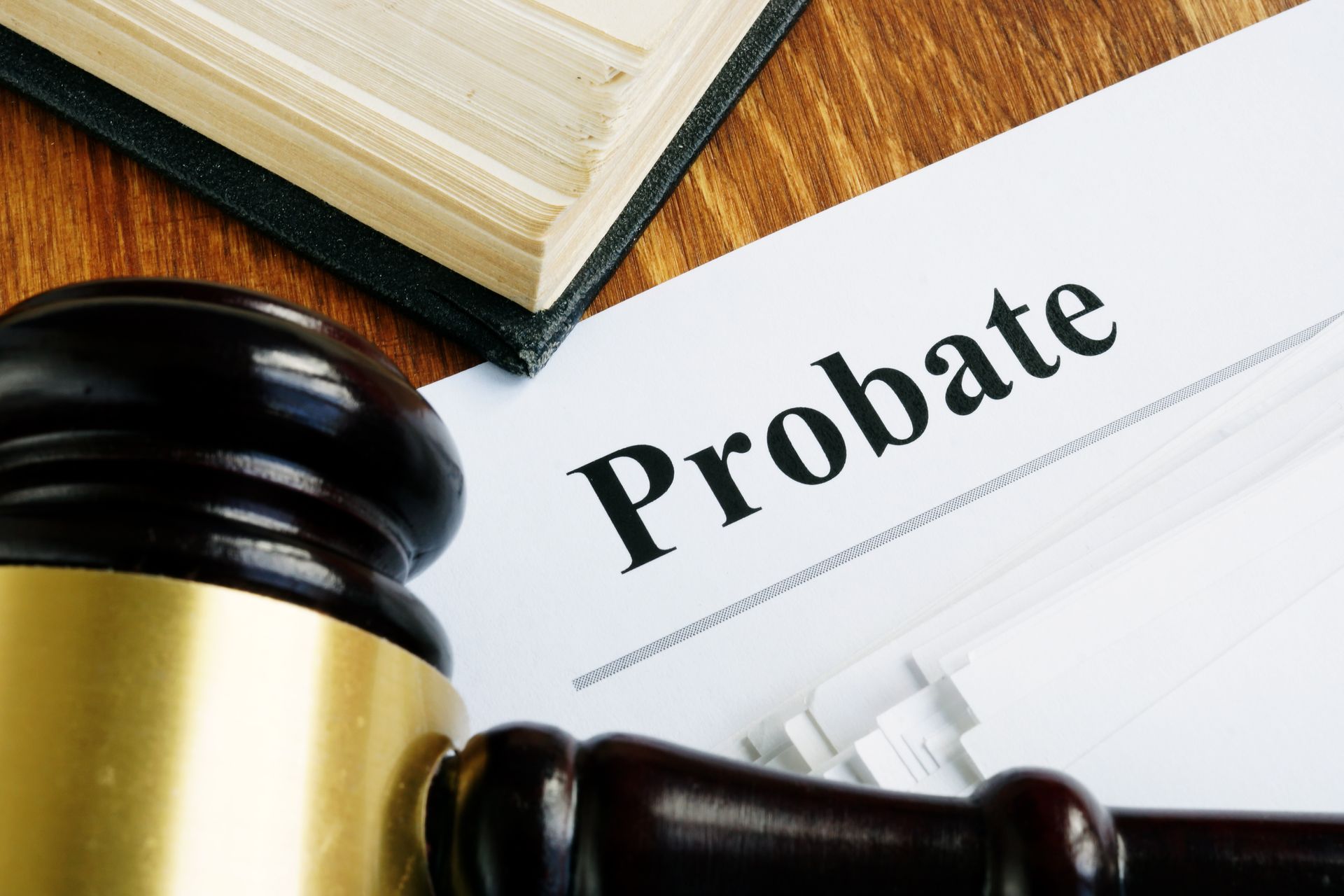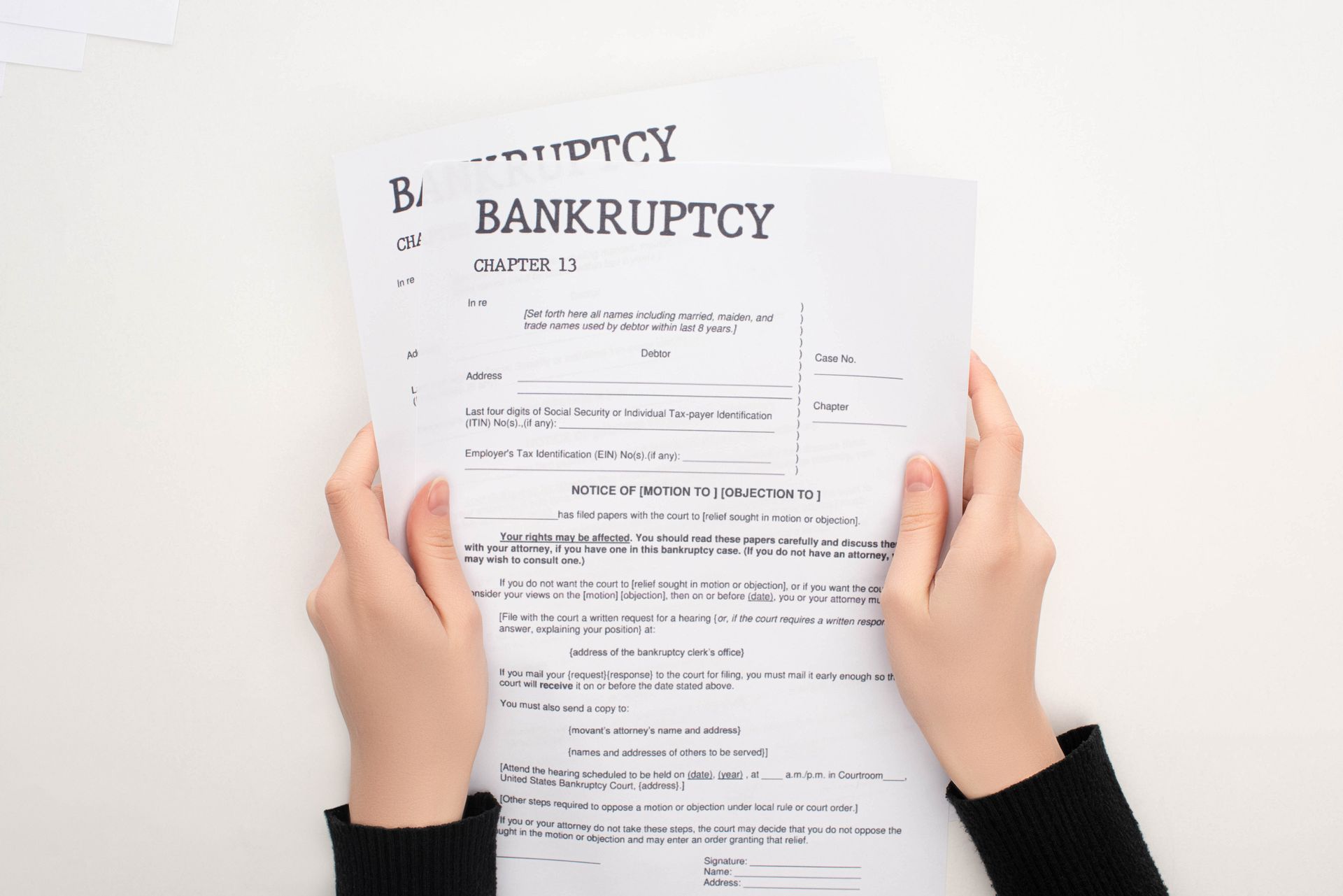Contact Us
Phone: 562-620-7290
Location
18000 Studebaker Rd
Suite 325
Cerritos, CA 90703
Hours
- Mon - Fri
- -
- Sat - Sun
- Closed
Call Now For A Free Consultation: 562-620-7290
Our Legal Blog
Your Resource For Legal Information

18 Feb, 2024
Probate is a legal process that occurs after someone passes away. It involves the distribution of their assets to their heirs or beneficiaries. However, not all assets are subject to probate. This can leave many people confused as to what will need to go through probate and what won't. In this blog post, we'll discuss what assets are subject to probate in California and how an attorney can help you navigate the process. Assets Subject to Probate In California, any assets that are solely owned by the deceased person and do not have a designated beneficiary or transfer on death (TOD) designation will need to go through probate. This includes things like real estate, bank accounts, stocks and bonds, personal property such as jewelry or artwork, and vehicles. Assets Not Subject to Probate There are also many types of assets that do not need to go through probate in California. These include life insurance policies with named beneficiaries, retirement accounts with named beneficiaries, payable-on-death (POD) bank accounts, joint tenancy property with right of survivorship, and trusts. The Role of an Attorney in Probate Probate can be a complex process with many legal requirements and deadlines. An experienced probate attorney can help you navigate the process smoothly and ensure that everything is done correctly. Some ways an attorney can assist include: Filing the necessary paperwork with the court Handling creditor claims against the estate Working with appraisers to determine asset values Assisting with asset distribution to heirs or beneficiaries An attorney can also provide valuable advice on tax issues related to inheritance and estate planning for yourself or loved ones. How an Attorney Can Save You Time and Money While it may seem like hiring an attorney for probate would be expensive, it can actually save you both time and money in the long run. An attorney can help you avoid costly mistakes or delays that could hold up the process or result in legal disputes. They can also provide guidance on how to minimize tax liability and ensure that assets are distributed fairly and efficiently. Probate is an important legal process that can have a significant impact on your family's assets and finances after you pass away. Understanding what assets are subject to probate in California, as well as how an experienced attorney can help, is essential for ensuring a smooth process and protecting your loved ones' inheritance. If you need assistance with probate or estate planning, don't hesitate to reach out to a qualified attorney who can guide you through every step of the way.

31 Jan, 2024
Navigating the complexities of legal documents and understanding the roles of various legal figures is vital, especially when it comes to managing your property and affairs. For California residents, knowing about Durable Powers of Attorney (DPOA) for property could be essential in planning and managing property matters. In this post, we will explore what California Durable Powers of Attorney for property encompass, how they differ from lawyers, their specific responsibilities, and how an attorney can assist in this process. What are California Durable Powers of Attorney for Property? A California Durable Power of Attorney for property is a legal document that grants another person, known as an agent or attorney-in-fact, the authority to manage your property and financial affairs. This might include handling bank transactions, managing real estate, filing taxes, and so forth. The "durable" aspect of the POA refers to its validity even if the principal (the person who made the Power of Attorney) becomes incapacitated. It's a proactive way to ensure that your property is looked after according to your wishes, without interruption, should you be unable to do so yourself. Durable Powers of Attorney vs. Lawyers It's essential to note that a Durable Power of Attorney for property is not the same as having a lawyer. While a lawyer can be appointed as your attorney-in-fact, not all agents are lawyers. The appointed agent in a DPOA is simply someone you trust to manage your property and financial matters, and they do not necessarily have to be a legal professional. A lawyer, on the other hand, is a licensed professional who represents and advises clients in legal matters. Responsibilities of a Durable Power of Attorney for Property The responsibilities of an attorney-in-fact under a DPOA for property are broad and should be clearly outlined in the legal document. Generally, they have a fiduciary duty to act in the principal's best interest, make prudent decisions regarding property and financial matters, and avoid conflicts of interest. Their specific responsibilities could include: Paying bills and managing bank accounts. Buying, selling, or managing real estate and other properties. Investing and handling transactions. Filing and paying taxes. Handling matters related to insurance and benefits. How Can an Attorney Help? Even though you don't need an attorney to serve as an agent, consulting with an attorney when creating a DPOA for property is advisable. They can help draft a DPOA that accurately reflects your wishes, offers comprehensive coverage of your assets, and provides clear guidance to your chosen agent. An attorney can also ensure the DPOA complies with California state laws. Moreover, if disputes arise, or if there is a need to interpret the terms of a DPOA, having legal counsel can be invaluable. An attorney can protect the principal's interests, guide the agent through their responsibilities, and provide legal advice on managing property matters effectively. A California Durable Power of Attorney for property is a powerful tool in property management, particularly in instances of unforeseen incapacitation. It differs significantly from the role of a lawyer but stands as an essential element of estate planning and management. When drafting such a document, the guidance of a knowledgeable attorney can be fitting to ensure that your property and financial affairs will be handled as you see fit. By understanding the purposes and responsibilities associated with a DPOA for property, California residents can make informed decisions that secure their interests and provide peace of mind in any circumstance.

20 Dec, 2023
Bankruptcy is a legal process that can help individuals and businesses get a fresh start financially. Chapter 7 bankruptcy, also known as liquidation bankruptcy, is one of the most common types of bankruptcy filed by individuals in California. The process involves selling off certain assets to pay off creditors, but many people wonder what they can keep and what is considered exempt. In this blog post, we will explore California’s bankruptcy exemption rules and answer the question, “Can I keep my home and car in Chapter 7 bankruptcy?” 1. Protected Property in Chapter 7 Bankruptcy: In Chapter 7 bankruptcy, debtors must surrender non-exempt assets to a bankruptcy trustee. These assets will be sold to pay down debt. However, California has specific exemption rules that allow debtors to keep certain assets. These exemptions are meant to ensure the debtor has enough property to live and work. The protected property includes personal property, such as clothing, household goods, and necessary tools of the trade. California also allows debtors to keep a certain amount of equity in their home and car. 2. California’s Homestead Exemption: Californians can claim a homestead exemption to protect the equity in their primary residence. In California, the homestead exemption amount is currently $600,000 for individuals and $900,000 for married couples filing jointly. This means that if the equity in your home is less than the exemption amount, you can keep your home. However, if the equity is higher than that amount, the bankruptcy trustee may sell the home and use the proceeds to pay off creditors. 3. California’s Motor Vehicle Exemption: California debtors can also claim an exemption for their car or other motor vehicle. The exemption amount is currently $3,325. If the equity in your car is less than the exemption amount, you can keep your car. If the equity is higher, the bankruptcy trustee may sell the car and use the proceeds to pay off creditors. 4. Other Exempt Property: In addition to a homestead exemption and a motor vehicle exemption, California debtors can claim other exemptions. For example, California allows debtors to exempt retirement accounts and certain life insurance policies. There are also exemptions for personal injury awards and workers’ compensation benefits. It’s important to understand these exemption rules and consult with a bankruptcy attorney to ensure you are protecting all of your exempt assets. 5. Non-Exempt Assets: It’s important to note that not all assets are exempt in bankruptcy. Non-exempt assets include luxury items, investment properties, second homes, and valuable artwork. These assets can be sold by a bankruptcy trustee to pay off creditors. If you have non-exempt assets, it’s important to discuss your options with a bankruptcy attorney to determine the best course of action. In conclusion, California’s exemption rules allow debtors to keep certain assets in Chapter 7 bankruptcy, including their primary residence and motor vehicle. However, it’s important to understand the exemption rules and consult with a bankruptcy attorney to ensure you are protecting all of your exempt assets. If you have non-exempt assets, a bankruptcy attorney can help you determine the best course of action to protect your assets and get a fresh financial start. Remember that bankruptcy is a legal process that can have long-term consequences, so it’s important to approach the process with an experienced attorney by your side.

30 Nov, 2023
Estate planning is a crucial aspect of ensuring that your assets are distributed to the right people when you pass. However, appointing an executor to your will is just as crucial as planning your estate. An executor's role is to carry out your final wishes according to the instructions in your will. In this blog post, we'll provide you with an overview of the executor's role in estate administration, who appoints them, whether they can be changed, and how hiring an attorney can help with your estate planning process. What Is the Role of an Executor in Estate Administration? An executor is the person named in your will who is responsible for managing your estate after you pass away. They are responsible for locating and securing all of your assets and property, paying bills, collecting debts owed to your estate, and distributing your property according to your will. They also have the legal authority to make important financial decisions and legal arrangements for your estate. Who Appoints the Executor? You can choose your executor when you create your will and make it official. You can appoint anyone, as long as they are over 18 years old, mentally capable to fulfill the role, and not declared bankrupt. You can also appoint an attorney or a professional executor as long as they are willing to take on the responsibility. It is essential to appoint someone who you can trust and who will take their role seriously. It's also important to have a backup executor in case your first choice is unable to serve. Can You Change the Executor? Yes, you can change your executor by revising your will with an attorney's help. There are several reasons why you may need to replace your executor. For instance, if the original executor is unwilling or unable to fulfill their role, it's important to know that you can change this part of your estate plan at any time. However, if you've passed away, then your will becomes irrevocable, and it's too late to make any changes. How Can an Attorney Help? Hiring a qualified estate planning attorney can be beneficial in several ways. An attorney can help you select the right executor based on your unique needs and situation. They can also draft a legally binding will that includes the executor's role and responsibilities. Additionally, an experienced attorney can provide legal advice on estate planning and help you minimize the amount of estate taxes your heirs will need to pay. Choosing the right executor is an essential part of estate planning. This person will be responsible for managing your assets, ensuring that your final wishes are carried out, and distributing your property according to your will. California residents should select an executor that they trust and ensure the person is aware of their role and responsibilities. If you need assistance with estate planning, contact a qualified estate planning attorney today to guide you through the process and ensure that your final wishes are met.

01 Nov, 2023
Bankruptcy is a legal process that helps individuals and companies who are struggling financially to get a fresh start. Among the different types of bankruptcy, Chapter 11 bankruptcy is perhaps the most complex and expensive, but it can also provide the most flexible and powerful tools for businesses that wish to restructure and rebuild their operations while paying off their debts. In this blog post, we will discuss how Chapter 11 bankruptcy works, what benefits it provides, and how you can file for it in California. How does Chapter 11 bankruptcy work? Chapter 11 bankruptcy is also known as reorganization bankruptcy, and it allows businesses to restructure their debts and operations over time while continuing to operate. In Chapter 11 bankruptcy, the debtor (the business) becomes a "debtor in possession," which means that they remain in control of their assets and operations while they come up with a restructuring plan and negotiate with their creditors. The bankruptcy court supervises the process and approves or disapproves the plan, depending on whether it is feasible and fair to all parties involved. The debtor must file a petition for Chapter 11 bankruptcy with the bankruptcy court, along with a list of assets and liabilities, a statement of financial affairs, and a proposed plan of reorganization. The debtor must also pay a filing fee and a fee for the U.S. Trustee, who monitors the case and appoints a committee of unsecured creditors to represent the interests of all parties. The debtor must disclose all their financial information and cooperate with the trustee's requests for information and documents. Benefits of Chapter 11 bankruptcy Chapter 11 bankruptcy offers many benefits to businesses that are struggling, but also have a viable and valuable business model. These benefits include: - An automatic stay that stops all creditors' collection actions and lawsuits against the debtor while the case is pending. - The ability to propose a reorganization plan that may reduce or eliminate some debts and allow the business to operate more efficiently and profitably. - The ability to conduct business as usual and maintain relationships with suppliers, customers, and employees, thereby reducing the risk of layoffs, asset sales, or liquidation. - The ability to adjust the terms of existing contracts that are burdensome or unprofitable, such as leases or loans. - The ability to sell or purchase assets or businesses in a more efficient and orderly manner, with court approval and protection from creditors' claims. - The ability to retain key employees or executives by offering incentives or equity stakes in the reorganized business. How to file for Chapter 11 bankruptcy To file for Chapter 11 bankruptcy in California, you must follow these steps: - Hire an experienced bankruptcy attorney who can guide you through the process and represent you in court. - Prepare a detailed disclosure statement that explains your business operations, assets, liabilities, and financial projections, along with the proposed plan of reorganization. - File a voluntary petition for Chapter 11 bankruptcy with the U.S. Bankruptcy Court in your district, along with the required schedules, statements, and fees. - Attend a 341 meeting of creditors, where you will be questioned by the trustee and your creditors about your finances and proposed plan. - Negotiate with your creditors and the U.S. Trustee to reach a consensus on the plan, or submit the plan for confirmation by the court if no agreement can be reached. - Implement the plan and operate your business under the court's supervision until you have fulfilled all the terms and paid off your debts. Chapter 11 bankruptcy can provide a lifeline for businesses that are struggling to stay afloat but have a viable chance to reorganize and rebuild. However, the process is complex, expensive, and challenging, and it requires a careful planning and expert guidance. If you are a California resident and are considering Chapter 11 bankruptcy, consult with an experienced bankruptcy attorney to assess your options and make an informed decision. With the right strategy and support, you can emerge from bankruptcy stronger, more resilient, and more successful than ever.

By Onyinye Anyama
•
30 Sep, 2023
A power of attorney (POA) is a legal document that allows an appointed person to act on behalf of another in specific situations. It is a useful tool for managing finances, making medical decisions, and handling various legal matters. However, there comes a time when a POA ends, and its termination can occur for various reasons. In this blog post, we will discuss how a power of attorney ends, the circumstances that lead to its termination, whether it can be changed and how an attorney can help you navigate this process in California. How Does a Power of Attorney End? A power of attorney terminates in the following circumstances: 1. Duration: The POA has a specific duration or ends on a specific date, which is stated in the document. 2. Completion: The purpose of the POA is completed. 3. Revoke: The principal revokes the POA. The revocation must be done in writing, and the appointed person must be notified. 4. Death: The principal dies. 5. Incapacity: The principal becomes incapacitated, and there is no successor agent or contingency plan. Can the Power of Attorney Be Changed? A POA can be changed if the principal is still mentally competent and capable of making decisions. If there is a need to change the POA, the principal must complete a new document revoking the old one and appointing a new agent. If the principal becomes incapacitated, they can no longer change the POA, and their agent must follow the terms of the existing POA. How Can an Attorney Help? An attorney can help with the following regarding power of attorney: 1. Drafting: An attorney can draft the POA document that meets your needs and is in compliance with California law. 2. Reviewing: An attorney can review an existing POA, which you are considering signing, to ensure that it complies with California law and that it meets your specific needs. 3. Termination: An attorney can help you terminate a POA when necessary by drafting a revocation document and advising you on the legal process. 4. Changing: If you need to change your POA, an attorney can assist you in drafting a new document revolving the old one and appointing a new agent. 5. Litigating: An attorney can help you for contesting the validity of the POA or in settling disputes between the agent and the principal or other parties. In summary, a power of attorney is an important legal document that can assist you in managing finances, making medical decisions and handling various affairs. It is essential to understand how it can end and the process of changing it. An attorney can help you navigate this process and ensure that your interests are protected throughout the legal process. If you need assistance with power of attorney issues, please contact an attorney for advice.

By Onyinye Anyama
•
31 Aug, 2023
As a Texas resident, it's important to understand the difference between a trust and a will. Both legal instruments are used in estate planning, but they serve different purposes and have varying benefits. Knowing the advantages and disadvantages of each can help you make informed decisions that align with your goals and priorities. This blog post aims to provide you with a clear understanding of these legal documents, helping you determine which one suits your needs best. 1. Defining Trust and Will A will is a legal document that outlines how a person's estate and assets will be distributed after their passing. It is a legal declaration of a person's final wishes and includes details about the beneficiaries, guardianship, and other important information. A trust, on the other hand, is a legal arrangement that appoints a trustee, who manages and distributes a person's assets to the beneficiaries. Trusts can be set up during a person's lifetime or after their death, and they can be revocable or irrevocable. 2. Differences in Probate Process In Texas, the probate process refers to a legal process that determines the validity of a will and oversees the distribution of assets according to the will's instructions. One of the primary differences between a trust and a will is the probate process. Assets held in a trust do not pass through probate, which can be a lengthy and complicated process. Assets distributed through a will, however, are subject to probate, which can cause delays and additional expenses. 3. Privacy Another significant difference between a trust and a will is privacy. A will is a public document, which means that once it is submitted to probate court, it becomes a public record. This means that anyone can access the document and learn about its contents. A trust, however, is a private document that is not subject to public disclosure unless required by law. A trust provides greater privacy and confidentiality than a will. 4. Flexibility A trust offers greater flexibility than a will in terms of asset distribution and management. With a trust, you can specify different distribution schedules, such as distributing assets immediately after your passing or spreading distributions over a specific period or time. Additionally, a trust can be used to manage assets during your lifetime if you become incapacitated or unable to manage your finances. A will, however, does not allow for this level of flexibility and control over asset distribution. 5. Cost Cost is another important consideration when deciding between a trust and a will. Generally, trusts are more expensive to set up and maintain than wills. Trusts require more upfront planning and legal assistance, but they often result in fewer costs during the probate process. Wills, on the other hand, require only an attorney's assistance to create and often result in additional expenses during the probate process. Trusts and wills are both significant legal documents in estate planning, but they serve different purposes. The decision to create a trust or a will depends on various factors such as the level of privacy, flexibility, and costs. I hope this post has helped you understand the differences between these documents and given you an idea of which one would best suit your needs. It is always best to consult with an experienced estate planning attorney to identify the best legal instrument that meets your individual requirements.
Schedule a Case Evaluation
Contact us now!
Homepage FCE Form
Thank you for contacting us.
We will get back to you as soon as possible.
We will get back to you as soon as possible.
Oops, there was an error sending your message.
Please try again later.
Please try again later.
By submitting this form, you agree to be contacted by our law firm, either by phone, text or by email.
Practice Areas
Hours
- Mon - Fri
- -
- Sat - Sun
- Closed
Weekends Available By Appointment
Disclaimer: The information on this website is for general information purposes only. Nothing on this site should be taken as legal advice for any individual case or situation. This information is not intended to create, and receipt or viewing does not constitute an attorney-client relationship.
© Copyright 2024 | All Rights Reserved | Anyama Law Firm, A.P.C. | Powered By Convert It Marketing | Privacy Policy


